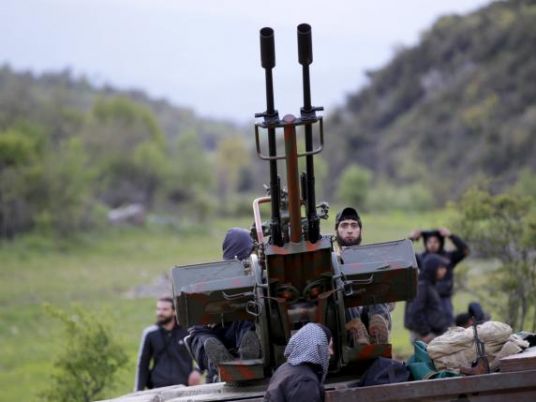
Syrian television said on Sunday that Islamist insurgents who seized a key northwestern town had since slaughtered civilians, but monitors of the war said only government supporters had been detained and no one killed.
Rebels including al-Qaeda's Syria wing captured Jisr al-Shughour for the first time in the four-year conflict on Saturday, edging closer to Latakia, the coastal province of vital importance to President Bashar al-Assad.
"Terrorist groups committed a horrific massacre of civilians after entering Jisr al-Shughour," state television quoted a military source as saying. It said at least 30 civilians had been killed in the town close to the Turkish border.
But the Britain-based Syrian Observatory for Human Rights, which monitors the grinding civil war, said combatants had detained government backers and that there was no confirmation so far they had killed anyone.
"If we knew people were killed by them we would report it," the Observatory's founder Rami Abdulrahman said. "No women and children were captured."
His monitoring group, which says it collects information from all sides of the conflict, said at least 27 people, mainly insurgents, were killed after Syrian jets bombed Jisr al-Shughour. Heavy fighting continued south of the town.
The capture of the town of 50,000 people in Idlib province was the latest in a series of setbacks for government forces in the south and north of Syria.
State media said on Saturday the army had redeployed to the town's surroundings "to avoid civilian casualties". It said the army was battling "a large number of terrorists coming from the Turkish border".
On Sunday, the state news agency SANA said the military had carried out night raids around Jisr al-Shughour and inflicted heavy losses on its enemies.
Insurgents have been trying to push the army out of the few remaining government areas in the province.
Last month the Sunni Islamist rebels seized Idlib city, the provincial capital, after forming an alliance that includes Nusra, the hardline Islamist Ahrar al-Sham movement and Jund al-Aqsa, but not the rival, ultra-radical Islamic State group which controls large tracts of Syria and Iraq.
The Islamist alliance calls itself the Army of Fatah, a reference to the conquests that spread Islam across the Middle East from the 7th century.




